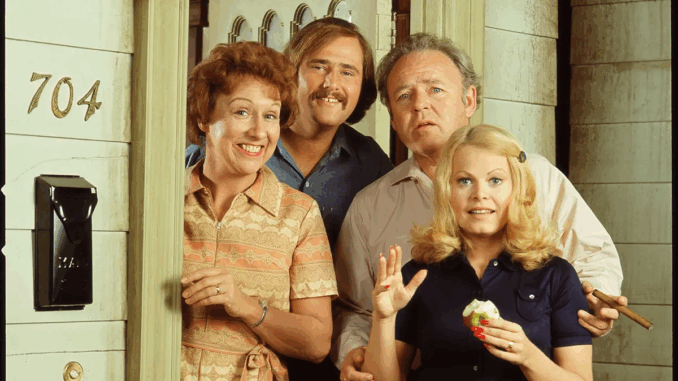
Before prestige dramas and edgy comedies ruled television, one sitcom dared to flip the script and America couldn’t look away.
From British Roots to an American Breakthrough
All in the Family hit CBS in 1971 and ran for eight groundbreaking seasons until 1979, before continuing under the title Archie Bunker’s Place until 1983. Based on the British series Till Death Us Do Part, creators Norman Lear and Bud Yorkin didn’t just remake a show, they reimagined what American TV could be.
And it worked.
For five straight years, All in the Family was the most-watched show in the U.S. It didn’t just win over audiences it won four consecutive Emmy Awards for Outstanding Comedy Series and forever changed the tone of television comedy.
Unfiltered, Uncomfortable, and Unapologetically Honest
At a time when sitcoms avoided controversy, All in the Family ran toward it. Race, gender, sex, bigotry, politics, class — nothing was off the table. The show didn’t sugarcoat. It satirized. It confronted. And in doing so, it made millions laugh, squirm, argue, and think — sometimes all at once.
It wasn’t just TV. It was a cultural reckoning, disguised as a living room sitcom.
Meet the Bunkers: America’s Most Unlikely TV Family

Set in Queens, New York, the series revolved around the Bunkers — a working-class white family at the heart of the national conversation.
At the center was Archie Bunker (Carroll O’Connor), a grumpy, loudmouthed bigot who viewed the changing world as a personal threat. He clung to his version of “the good old days” while railing against minorities, women, and pretty much anyone who wasn’t like him using language that was intentionally offensive to spark debate, not applause.
Archie’s outdated views were tolerated by his sweet, nervous wife Edith (Jean Stapleton), but constantly challenged by his liberal, outspoken son-in-law Mike Stivic (Rob Reiner), a college student married to Archie’s daughter Gloria (Sally Struthers).
The result? Explosive, hilarious, uncomfortable, and brilliant.
Mike and Archie clashed in every episode and through their arguments, the show dissected the very soul of a divided America.
A Legacy That Still Echoes Today
Without All in the Family, there would be no The Jeffersons, Maude, or Murphy Brown and probably no Atlanta or Black-ish either. It laid the foundation for every TV show that ever dared to say what others wouldn’t.
Even today, it remains a masterclass in bold storytelling. Because All in the Family didn’t just reflect society, it held up a mirror and dared us to take a long, hard look.
